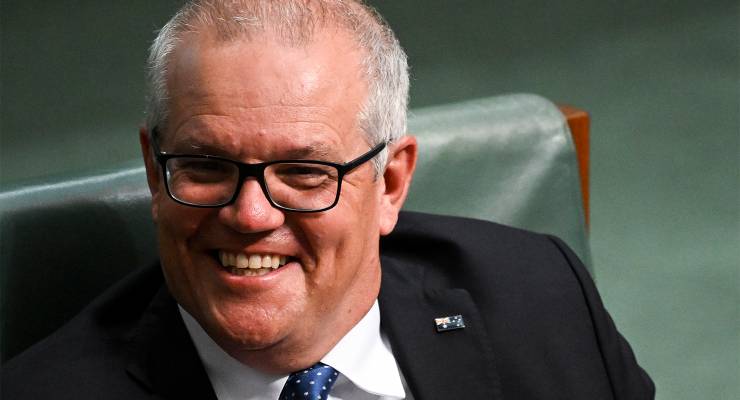
Scott Morrison’s handling of COVID-19 vaccinations and his Hawaii vacation during the Black Summer bushfires made him an easy target for opposition attacks and cost him his job, Labor Party election analysis has found.
Labor’s review of the 2022 federal election found Morrison’s unpopularity was the “most significant” factor behind the party’s win.
It was Labor’s fifth win from opposition in the past 100 years, the significance of which “cannot be overstated”, the review noted, undertaken by former cabinet minister Greg Combet and strategist Lenda Oshalem.
The analysis found several reasons Morrison lost support ahead of the election, including:
- His “failure to accept responsibility” for managing natural disasters, his Hawaii vacation during the bushfires, and saying “I don’t hold a hose, mate” when asked to defend the trip
- His failure to secure and roll out vaccine doses and rapid coronavirus tests during the pandemic, and “politicising” the virus crisis by attacking Labor premiers
- His “failure to understand and empathise with the experience of women”
- The fact he “politicised” Australia’s relationship with China
- His failure to develop a “credible” climate policy.
Even so, the Labor Party managed to scrape a primary vote of only 32.6%, its lowest since 1934.
Curiously, the same anti-Morrison sentiment that Labor believed cost the ex-prime minister the election also contributed to the low primary turnout for Labor. The “decision by the Labor campaign to focus voter attention on Scott Morrison’s shortcomings as a leader” was listed as “contributing to Labor’s low primary vote”.
Other factors, according to the party, included declining voter trust in both the Coalition and Labor, driven by mistrust in government, politics and politicians.
The party also concluded many of its supporters cast tactical ballots in support of high-profile independent candidates.
One such candidate was Dai Le, the independent who won Fowler. It was Labor’s first loss since the seat was created in 1984.
The party came close to acknowledging the widely held view that voters there punished Labor for trying to parachute in ex-senator Kristina Keneally, rather than running a local candidate. “Labor’s candidate selection” was listed as one of the reasons for the loss.
But the review also pointed to the prominence of Fairfield City mayor Frank Carbone, “a former Labor power broker in the area”, who backed Le. The review said Carbone’s status in the district was elevated by his tough opposition to the extra-harsh lockdowns imposed on certain western Sydney areas by the Coalition state government.
“The lockdowns contributed significantly to anti-major party sentiment,” the review said, adding the Liberals also experienced a negative 12.89% swing.
The lesson from Fowler, the review said, was to remember that “no seat is safe”.








It’s worrying that with the terrible non-performance over nine years of the coalition government, that a single personality was what (apparently) swayed voters.
Agreed. The coalition was made up of many people who were incompetent at best and in some cases outright liars and frauds who seemed to have little interest in doing what was best for the country. Yet it was Morrison’s unpopularity that got Labor over the line. Gobsmacking really.
When you are TOXIC you are toxic…..
Correct. Morrison was only one factor in removal of that dreadful Government. They would not have got the previous years either but for Shorten.
I do think it is difficult to explain to a survey/caller the full range of matters that run through my mind as I vote. Now 81 I have never voted LNP and cannot ever envisage myself doing so.
With Morrison (and Abbott) the main reason would have been their “failure to understand and empathise with the experience of women”. I have enormous regard for Grace Tame, Brittany Higgins, Saxon Mullins, and other young women who have had to courage to go public about their treatment in 2020s Australia. If I had to choose just one single swaying image it would be Grace Tame’s eye roll outside Kirribilli House – the one Jenny Morrison suggested was bad manners.
I did vote Liberal / National, for thirty years, from Fraser to Turnbull.
Scott Morrison is the worst human I have come across in 57 years.
With Morrison in the background, The Evil Dark Lord as leader and the push to move further right, the Coalition will occupy the opposition benches for a decade.
Not in his own electorate though.
I wonder how Morrison’s electoral support looks in Cook now that he has led Coalition to defeat, been critiqued by colleagues and censured by Parliament?
No monetary return for pollsters to test that now, but from political science perspective it would be good to have a base line for next election (bi-election perhaps).
My tip is that we might find out after the NSW state campaign is over. (Ahhgg…. I’ve let myself drift into tipster void. Bugger.)
“A single personality was what (apparently) swayed voters.”
Identical result to the 2019 federal election then.
The legacy of the Rudd/Gillard/Rudd Governments still resonated with some voters and likely contributed to Labor’s low primary vote.
The Murdoch media had a lot to do with maintaining the concept that R/G/R were appalling and made sure that none of their successes were seen in that light. So, thanks to Rupert for giving us 9 years of LNP disasters, mismanagement, misogyny and cronyism. On the present reckoning Rupert may find it a lot more challenging in the future.
It’s hard not to agree that Morrison, in various ways, is the main reason Labor won the last federal election. The Guardian‘s Katharine Murphy memorably summed up Morrison’s marketing strategy, and the voters gave their judgement last May:
Still find it hard to believe that Morrison was given a full six week campaign to reinforce our dislike. Total political incompetence, cheered on by the political media.
This is a key point ‘cheered on by the political media’.
Australia does not have a broad and deep media holding power to account, but a monocultural legacy oligopoly running protection for the LNP (& themselves), hence, precluding any balance in reporting on Labor, other parties and relevant issues.
Too many decades of do-nothing and self serving pollies, internecine fighting, wasted opportunities and a loudly ticking climate alarm clock have resulted in the voters figuring out a work-around the two-party dominant system that looked set to send us all over the cliff. Hence the increased Greens/Teal vote.
Albo is PM at a delicate, potentially paradigm-shifting, point in the evolution of Oz politics. If he can come thru with the goods, if he can maintain integrity and decency, and continually strive towards creating a more fair and sustainable nation, then he will succeed in 1) restoring credibility in the ALP and 2) just being the sort of leader people actually want and need.
If he fails, if he sells out, if it looks like he’s going to be just another frontman for the status quo, then both major parties will have done their dash. People know how to get rid of them now, and with a growing cadre of younger voters and a shrinking group of older rusted-ons, this is their final warning i reckon.
Personally, I think Albo’s the right guy for the times, but he really needs to do something about the M urdoch and mates media machine, to stop it all winding up in the gutter again. That problem ain’t going away, even if it has currently toned down following some major losses.
‘but he really needs to do something about the Murdoch and mates media machine’….AND the ABC.